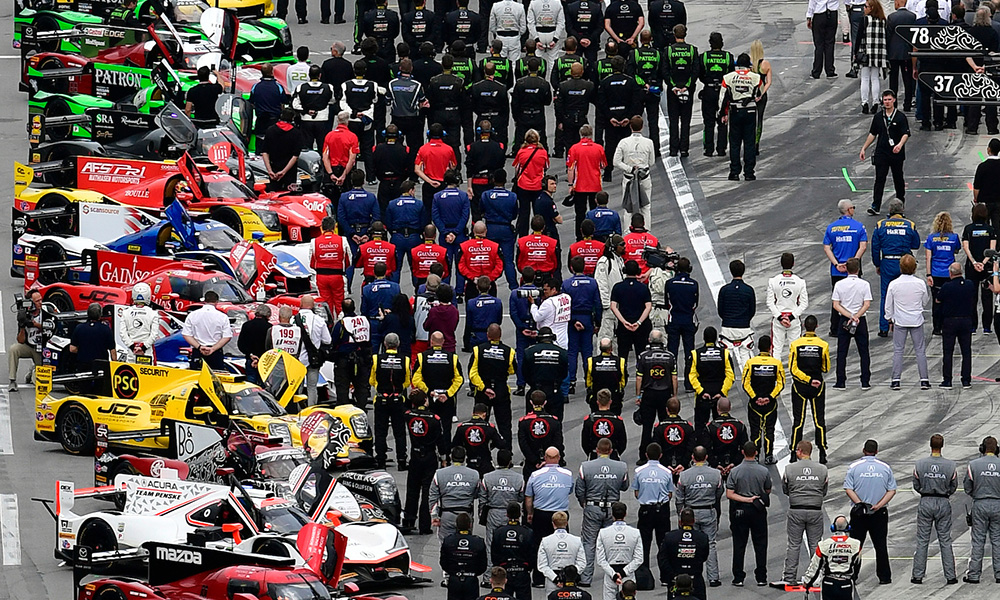
Photo: Scott LePage/IMSA
IMSA President Scott Atherton is encouraged by the FIA and ACO’s proposed 2020 prototype regulations revealed on Friday at Le Mans, but admitted costs are still “the biggest hurdle” to the platform coming to the IMSA WeatherTech SportsCar Championship.
High-ranking IMSA staff were involved in the discussions for the regulations which seek to create a greater brand identity than current prototypes while still encouraging technological innovation in hybrid powertrains and reducing costs to one-quarter of current LMP1 hybrid budgets.
It is the latter point that could prove to be the stickiest, according to Atherton, with proposed budget figures for the yet-to-be-named prototype regulations coming in significantly higher than those of DPi manufacturers currently competing in IMSA.
“The biggest hurdle, certainly, is budget.” Atherton told Sportscar365.
“High marks to the FIA and the ACO for achieving what they have to date in that the current LMP1 budget is extremely expensive and they have done an outstanding job of reducing that while still introducing an interesting, exciting, technically relevant product.
“Even with those significant reductions, the proposed budgets, the talked about budgets that are connected with this generation of car, still represent a significant increase over where we are today [with DPi].
“And that’s where the challenge lies.
“We have manufacturers that have expressed similar concerns that even with the reductions that have been proposed, it’s still not to the level that would give them the opportunity to participate, and that’s where the challenge lies.”
Atherton said crafting common regulations to unite endurance sports car racing globally is the ultimate goal and an outcome that could shift the trajectory of the sport for the positive, but added it can’t come at the expense of IMSA’s core tenants.
“[Common regulations] would be lightning in a bottle, no question about it,” he said. “That’s the goal.
“What I would say, and this is not new information, if that goal could be realized while still enabling IMSA with the WeatherTech Championship to maintain the core elements that have made the DPi formula successful.
“What we won’t do is agree to regulations, involve ourselves in regulations, that abandon those core tenants, just for the sake of saying we have a global formula.”
Atherton said he’d consider the introduction of hybrid technology for the first time in the WeatherTech Championship.
“We’re open minded to new details, new regulations, to changes in the car configuration, to changes in the extreme branding elements,” he said. “That’s all open. Hybrid technology, not an issue.
“What becomes the challenge there is how do you put the proper controls in place so that you don’t have a repeat of what everyone has now witnessed with LMP1.
“I think we’ve demonstrated that you can have cost-effective prototypes with regulations that are attractive to manufacturers, to fans. It works.
“We’ve got a good thing going on in North America right now and we want to be part of a solution, as we are with out GT formulas. GTE, GTLM are one of the same. GT3 is global.
“If we can apply that same mindset to the prototype category, all the better. But we’ve got to maintain the core elements of what has made our current platform successful.”
DPi DNA Evident in New Regulations
IMSA’s DPi concept, a brand-specific prototype platform with significant cost controls built into the regulations, shares a great deal in common with the plans the ACO and FIA announced.
Asked if he took pride in seeing his French counterparts following a similar path, Atherton conceded that it was gratifying to see the IMSA’s influence manifested in the global future of the sport.
“The short answer would be yes,” he said. “The way it’s described and the way it’s positioned here takes it to an impressive level, more extreme.
“Our mission right now with DPi is not that extreme and it’s to give manufacturers an opportunity to take existing design elements from existing road cars and incorporate them into a prototype format.
“Ironically, when we first approached the ACO with that idea it was not well-received.
“To actually have that now be one of the primary, foundational elements of the 2020 regulations, that’s where the satisfaction comes in for sure.”


























